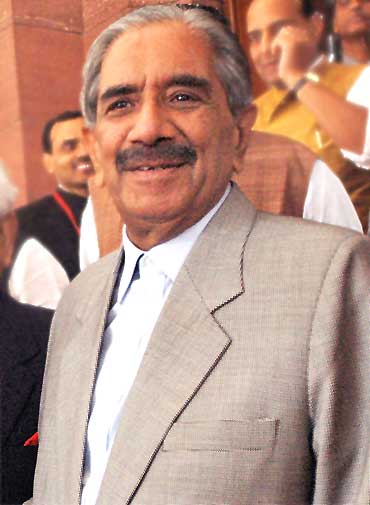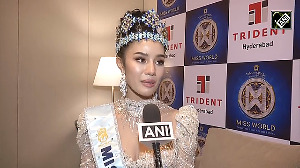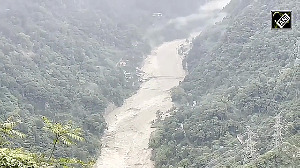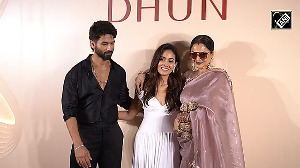 R K Dhawan was considered Indira Gandhi's Man Friday, her shadow, and was witness to the highs and lows in her life. Here he gives his ringside view of the events leading up to the Emergency
R K Dhawan was considered Indira Gandhi's Man Friday, her shadow, and was witness to the highs and lows in her life. Here he gives his ringside view of the events leading up to the Emergency
Let me tell you what I know about the Emergency, I don't utter lies, so will only tell you the facts -- whether anyone likes it or not.
If you look back, Mrs Indira Gandhi won the 1971 elections after the Bangladesh war. She had declared mid-term elections and won it. Somehow or the other, the Opposition united against her, and which didn't like her from day one in 1966 onwards, when she became prime minister after Lal Bahadur Shastri's death.
They could not adjust to the fact that she had emerged such a strong person, because when they (the Congress-0) chose her, they thought she would be a puppet. So right from 1973 onwards they started creating problems for her.
They raised various issues, the LN Mishra case (Mrs Gandhi's railway minister was target of a campaign that he was a conduit for slush funds from the KGB. Mishra was killed in a blast in 1975), then they propped up the veteran leader Jayaprakash Narayan to lead the campaign. That started against the Gujarat government and ultimately led to the central government.
Then Morarji Desai jumped into the picture, he wanted the Gujarat assembly to be dissolved. In order to achieve their ends, all of them were indulging in activities which were not commensurate with the prevailing system, the prevailing atmosphere and the political situation at that time. They started calling for strikes, like the railways strike in 1974, and those things culminated in a situation where something had to be done.
Then you know, they started having meetings and decided that somehow or the other, come what may, they have to throw her out, and started indulging in all sorts of whispering campaigns, malicious propaganda, and ultimately they gave a call to the services, army, air force etc, that they should not obey the orders of the government.
So they were creating chaotic conditions which would have disintegrated the country. They were very disturbing times.
The government's side used to have a number of meetings among senior leaders. And by the beginning of 1975, it was felt that some drastic measures were required. But what sort of drastic measures should they be? There used to be various discussions among leaders, Dev Kant Barooah, Rajni Patel, Mohsina Kidwai, Umashankar Dikshit, and many others, and of course Siddhartha Shankar Ray.
Ray came up with the novel idea that we should, somehow or the other, make a list of all the top leaders who were creating problems, especially the Rashtriya Swayamsevak Sangh, and arrest them. He was able to persuade Barooah, they used to have meetings, and they told Mrs Gandhi that you must tell the home minister (Dikshit) to prepare a list of the persons to be arrested, and the chaotic conditions should be controlled.
All this action was being planned in the month of January. And it is a matter of record, in writing, what SS Ray wanted. Somehow, Mrs Gandhi was exploring various other possibilities, other ways and other courses of action. In the meantime, the judgment of the Allahabad high court came in June 1975, and that very judge who gave the verdict against her stayed the operation of the judgment, and allowed her to appeal against his judgment in the Supreme Court.
But the Opposition took the opportunity, they never wanted her to stay on, they wanted her to resign immediately, so they stepped up their campaign, Jayaprakash Narayan, Morarji Desai, all these people ganged up and stepped up their campaign. On the other side the Congress party told her no, no, you must not resign, you must continue. In the meantime various people started holding rallies in Delhi, the public came out. By then the situation had reached a climax.
Ray along with Mrs Gandhi met the President (Fakhruddin Ali Ahmed) and held long discussions if the Emergency should be declared.
I did know when she went to the President, I was also there, after the meeting with the President she called me inside and told the President that he will come in the night and bring the proclamation to be signed by you. I did go and wake him up at around 12.30 am or 1 am, he signed the proclamation. But what the implications of the Emergency would be, they were not known to me. What sort of action was being planned, it was all being planned by this group I mentioned.
In the meantime, a team of officials were more loyal than the king. Like Navin Chawla (the current CEC), they were all close to Sanjay Gandhi. And the DIG of police started preparing a list of persons to be arrested. In this they were being assisted by Bansi Lal (Sanjay Gandhi's confidant). Ultimately Emergency was declared and this is the whole story behind it. The factual story.
I very strongly feel that Mrs Gandhi on her own was not inclined to declare Emergency. It was thrust upon her. Ray prevailed upon her. Rajni Patel, too. H R Gokhale, then law minister. She has expressed her regret for the Emergency in public.
I didn't tell her what I felt on this issue, because I didn't know what the implications were. Who were being arrested, what will be the consequences of Emergency. I didn't know the details.
If you ask anybody today about Emergency, they will support it, some things went wrong, yes, and the false propaganda against her. Lakhs and lakhs of people were sterilised, they said, the government even issued a notification asking whoever had been sterilised to come forward, but mind it, only 5000 applications turned up and only 2,000 appeared. In a vast country where they said lakhs and lakhs were forcibly sterilised, this was the final figure.
Sure, Mrs Gandhi was called a dictator by her opponents, but do you think they will ever speak in her favour? It is politics, and they were Opposition people. They had no logic in saying what they did. I didn't find any dictatorial tendency in her.
It is not a question of whether Indians like a tough ruler, they want the situation to be under control, everything should be normal, the system should work, Indian people want the system to work. It did during work some time in the Emergency.
Of course, a prime minister has to be tough. If you are not tough you cannot run the country. But Mrs Gandhi was her own person. She was steadfast in her ideals. Her main concern was how the people perceive a thing, and the best thing was, anything she does it should be received well by the people. Privy purses removal, nationalisation of banks, insurance, I think all those things were well received by the public.
I would say the Emergency ran very well for the first few months, later on certain people and certain state leaders started settling scores, and the Opposition and the false propaganda by them, specially about family planning, led to dissatisfaction and that is why the Congress party lost.
All those persons who were forcing her to declare the Emergency were the first to cross over, Ray was the first to oppose her. Barooah was the first to oppose her. Rajni Patel was the first to oppose her. Gokhale was the first person to appear before the Shah Commission and depose against her. All those persons who were the originators of the idea of the Emergency were the first to denigrate her.
It is very difficult to compare prime ministers of various eras to see what they would have done in her place, because conditions should be the same. The prime ministers after her did not face the problems faced by her. After her everyone had a smooth sailing.
But the Congress today is fine, the people today have started liking it. They have tried the Bharatiya Janata Party, the Rashtriya Janata Dal, the Bahujan Samaj Party, they have tried all other regional political parties. The Congress is the only party that can hold the nation together and they are turning to the Congress again, you have seen it in the elections. Let there be elections now and the Congress will form the government on its own majority.
In her time the situation was tough. Population had increased and it led to unemployment. Gap between rich and poor had increased like anything. All these things do lead to frustration.
Today, too, India faces threats of a different nature: internal security, unemployment, population growth, acts of the neighbour, because certain countries do not want India to be strong. It is not right to say the issues have remained the same, then we used to import everything, today we are manufacturing everything. We have made progress, but not commensurate with the speed with which our population has grown.
As told to Saisuresh Sivaswamy
Complete coverage: Emergency, India's darkest hour









